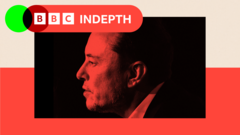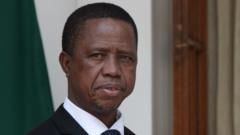In 2024, X has become a center for polarized political discourse catalyzed by Elon Musk's ownership, raising questions about the site’s impact on the global social media landscape.
Elon Musk's X: A Closer Look at the Transformation of Social Discourse in 2024

Elon Musk's X: A Closer Look at the Transformation of Social Discourse in 2024
The evolution of X, formerly known as Twitter, is reshaping political dialogue and challenging norms around misinformation and expression.
This year, under Elon Musk's stewardship, the platform X (previously Twitter) has undergone a significant transformation, emerging as a highly charged space for political discourse. Musk has consistently promoted X as a "bastion for freedom of expression," yet the shift in user dynamics and content moderation policies has led to increased polarization and the prominence of controversial figures.
With a reported decline in user trust and safety measures, platforms like X appear to prioritize unrestricted dialogue over limiting harmful content. One notable account, Inevitable West, has gained traction by framing its posts as a voice for the "silent majority," attracting significant followers while facing allegations of spreading disinformation. This perceived endorsement of divisive viewpoints, some linked to hate speech, highlights the complex relationship users now have with the platform.
Musk’s public association with former President Donald Trump poses additional implications, as their partnership may shape the future landscape of other social media companies in response to heightened political scrutiny. Observers note that the lack of robust moderation strategies may create a fertile ground for extremist views and misinformation, stirring debates over the ethical responsibilities of social media platforms.
Contrastingly, several users express newfound opportunities to monetize their presence on the platform as the shifting algorithms favor high-engagement posts, often amplifying sensational and polarizing content over factual accuracy. These changes underscore a broader trend affecting the moral fabric of online interactions.
As 2025 approaches, the legacy of Musk's leadership is increasingly ambiguous; while the promise of free expression is articulated, the reality may reflect a shift towards extreme rhetoric that threatens the integrity of public discourse. This social experiment, as described by insiders, raises critical questions about the balance between free speech and the moderating responsibilities of social media enterprises.
With political leaders recognizing X’s influence, the interplay between user engagement, corporate decision-making, and government relations may redefine how social media shapes political landscapes in the years to come. Such developments will continue to challenge existing norms and highlight the potential for both constructive discourse and dangerous radicalization.
Moreover, the ongoing global discussion around social media regulation signifies a pivotal moment for platforms navigating the intricacies of free speech and safety, as users adapt to the evolving climate of online engagement. As different countries introduce legislation aimed at curbing online harm, platforms like X will increasingly find themselves at the intersection of societal, political, and ethical considerations.
With a reported decline in user trust and safety measures, platforms like X appear to prioritize unrestricted dialogue over limiting harmful content. One notable account, Inevitable West, has gained traction by framing its posts as a voice for the "silent majority," attracting significant followers while facing allegations of spreading disinformation. This perceived endorsement of divisive viewpoints, some linked to hate speech, highlights the complex relationship users now have with the platform.
Musk’s public association with former President Donald Trump poses additional implications, as their partnership may shape the future landscape of other social media companies in response to heightened political scrutiny. Observers note that the lack of robust moderation strategies may create a fertile ground for extremist views and misinformation, stirring debates over the ethical responsibilities of social media platforms.
Contrastingly, several users express newfound opportunities to monetize their presence on the platform as the shifting algorithms favor high-engagement posts, often amplifying sensational and polarizing content over factual accuracy. These changes underscore a broader trend affecting the moral fabric of online interactions.
As 2025 approaches, the legacy of Musk's leadership is increasingly ambiguous; while the promise of free expression is articulated, the reality may reflect a shift towards extreme rhetoric that threatens the integrity of public discourse. This social experiment, as described by insiders, raises critical questions about the balance between free speech and the moderating responsibilities of social media enterprises.
With political leaders recognizing X’s influence, the interplay between user engagement, corporate decision-making, and government relations may redefine how social media shapes political landscapes in the years to come. Such developments will continue to challenge existing norms and highlight the potential for both constructive discourse and dangerous radicalization.
Moreover, the ongoing global discussion around social media regulation signifies a pivotal moment for platforms navigating the intricacies of free speech and safety, as users adapt to the evolving climate of online engagement. As different countries introduce legislation aimed at curbing online harm, platforms like X will increasingly find themselves at the intersection of societal, political, and ethical considerations.




















